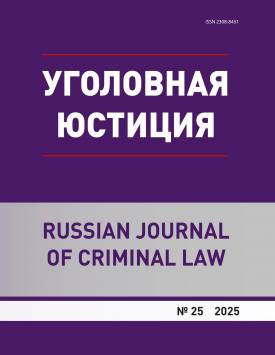On proving the subjective elements of extremist crimes
The article demonstrates negative trends in the practical work of criminal prosecution authorities and courts concerning the proving of subjective elements of extremist crimes. Using two criminal cases involving public calls for extremist activities committed via the Internet as examples, the author reveals two interrelated trends. The first negative trend is the insufficiently critical assessment by criminal prosecution bodies and courts of forensic expert reports examining defendants' speech products in these cases. The second negative trend is these authorities' inadequate and superficial analysis of the contextual circumstances of actions deemed extremist, along with the personal characteristics of defendants. To address the first trend, the author emphasizes the crucial need to strictly adhere to the principle of free evaluation of evidence under Article 17 of the Criminal Procedure Code of the Russian Federation and and specifically emphasized regarding the assessment of expert conclusions in two rulings of the Plenum of the Supreme Court of the Russian Federation when proving extremist crimes. This requires accounting for the scientific and methodological shortcomings in linguistic, psychological, religious studies, historical and other forensic examinations of speech products conducted in such cases. Consequently, prosecution authorities and courts must pay closer attention to alternative forms of specialized knowledge application permitted by law, particularly specialist conclusions and testimony. This would enable them to evaluate existing expert reports more critically yet substantively. Regarding the second trend, the author stresses the mandatory proving of motives for all extremist crimes, as well as direct intent and purpose for most such offenses. Accurately establishing these subjective elements requires comprehensive analysis of the situational context of allegedly extremist actions and defendants' personal characteristics. This requirement mirrors provisions in a special ruling by the Plenum of the Supreme Court addressing this category of crimes. The author declares no conflicts of interests.
Keywords
criminal procedural proving, subjective elements of crime, extremist crimesAuthors
| Name | Organization | |
| Mezinov Dmitry A. | Tomsk State University | mez_da@mail.ru |
References

On proving the subjective elements of extremist crimes | Ugolovnaya yustitsiya – Russian Journal of Criminal Law. 2025. № 25. DOI: 10.17223/23088451/25/12
